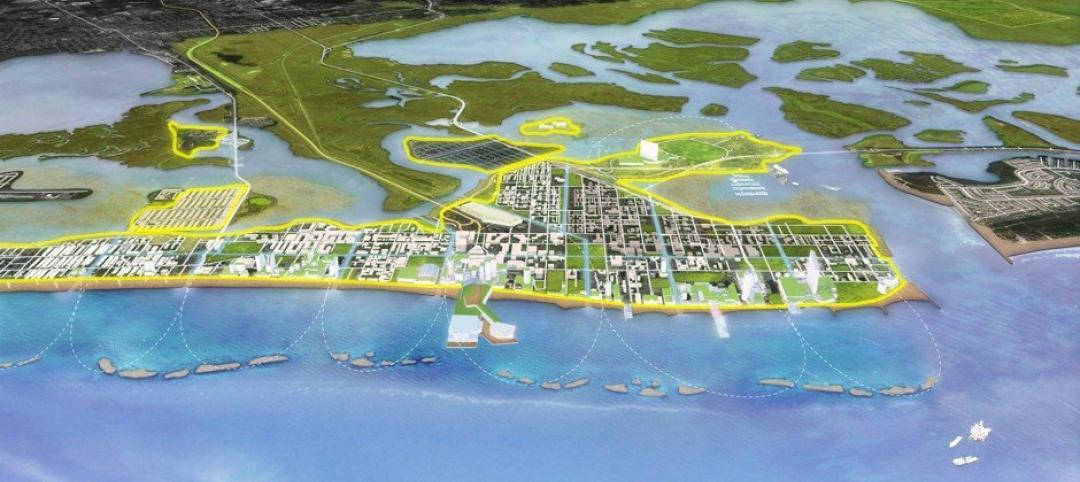The jury for the American Institute of Architects (AIA) Upjohn Research Initiative is providing $100,000 in grants to four research projects that will advance the future of architectural design and practice.
The purpose of the grant, now in its eleventh year, is to provide base funds for applied research projects that will advance the design profession’s knowledge and practice. The 18-month long project grant qualifies recipients to have their research findings and outcomes published both electronically and in a nationally distributed publication. This year’s recipients will research the following topics:
1.) The Impact of Biophilic Learning Spaces on Student Success
· Principal Investigators: James Determan, FAIA (Hord Coplan Macht) and Mary Anne Akers, PhD (Morgan State University).
· The researchers will study how biophilic learning environments correlate with stress reduction and enhanced cognitive performance toward improved learning outcomes for urban middle school students. A traditional classroom and an enriched classroom will be compared. Advised by the Salk Institute and Terrapin Bright Green, the researchers will enhance the biophilic classroom with a visual connection to nature, dynamic and diffused light, and biomorphic forms and patterns. This study aims to provide evidence of the link between biophilic classroom design and student success.
2.) Biophilic Architecture: Sustainable Materialization of Microalgae Facades
· Principal Investigator: Kyoung-Hee Kim, PhD (University of North Carolina at Charlotte).
· The project will prototype and study a microalgae façade, which is a sustainable building system based on the synthesis of biophilic, bioclimatic, and biomimicry design approaches. Results will provide alternatives to sustainable building materials and broaden the knowledgebase for integrated microalgae façades toward carbon-neutral building practices.
3.) Biodiverse Built Environments: High-Performance Passive Systems for Ecologic Resilience
· Principal Investigator: Keith Van de Riet, PhD, Assoc. AIA (The University of Kansas).
· Passive architectural systems capitalize on natural bioclimatic factors without the need for operational energy input. This project will study expanding the category of high-performance passive systems to include biodiversity as design criteria in architectural and landscape structures. The objectives of the study include the design and production of a full-scale prototype of an engineered-living wall panel derived from mangrove trees to be installed over an existing seawall in a tidal estuary. This process of integrating living systems within urban environments will be a collaboration among design and scientific communities.
4.) Tilt Print Lift - Concrete 3D Printing for Precast Assemblies
· Principal Investigators: Tsz Yan Ng (University of Michigan) and Wesley McGee (University of Michigan).
· The research seeks to develop 3D concrete printing technologies to produce prefabricated concrete panels for complex wall assemblies. The primary goal is to develop a prototypical panelized wall system that takes advantage of the geometric variability possible through additive manufacturing. Developing techniques for detailing and panel connections, this project will highlight new construction systems that are specific to 3D printing technology to address design-oriented goals. Focusing on the advancement of the manufacturing process, construction logistics, and performance criteria in relation to precast assemblies, the investigation will explore unique and novel designs for architectural production.
Grant recipients were selected this year by a seven-member jury comprised of members from the AIA College of Fellows and Board Knowledge Committee. Juror process and deliberations for selecting recipients were consistent with the double-blind peer review intent of the program, which helps add an element of rigor to the process whereby proposals are debated on their own merits. View this press release online here: https://www.aia.org/pres
Past recipients of the Upjohn Research Initiative can be reviewed on AIA’s website.
Related Stories
Sports and Recreational Facilities | Jul 29, 2015
Milwaukee Bucks arena deal approved by Wisconsin state assembly
Created by Milwaukee firm Eppstein Uhen Architects and global firm Populous, the venue will be built in downtown Milwaukee. Its design draws inspiration from both Lake Michigan, which borders Milwaukee, and from aspects of basketball, like high-arcing free throws.
Contractors | Jul 29, 2015
Consensus Construction Forecast: Double-digit growth expected for commercial sector in 2015, 2016
Despite the adverse weather conditions that curtailed design and construction activity in the first quarter of the year, the overall construction market has performed extremely well to date, according to AIA's latest Consensus Construction Forecast.
University Buildings | Jul 28, 2015
OMA designs terraced sports center for UK's Brighton College
Designs for what will be the biggest construction project in the school’s 170-year history feature a rectangular building at the edge of the school’s playing field. A running track is planned for the building’s roof, while sports facilities will be kept underneath.
High-rise Construction | Jul 28, 2015
Work begins on KPF's 'flared silhouette' tower in Manhattan
The 62-story, 157-unit luxury condo tower widens at the 40th floor, resulting in a gently flared silhouette, accented by a sculpted crown.
Museums | Jul 28, 2015
MUST SEE: Zaha Hadid's latest museum project is built into a mountain
The museum, dedicated to legendary mountaineer Reinhold Messner, is embedded within Mount Kronplatz in northern Italy.
Smart Buildings | Jul 27, 2015
Perkins+Will imagines new opportunity for Atlantic City
The architecture giant believes it has a solution that could put Atlantic City’s existing infrastructure to good use—by turning the Jersey Shore city into a research center for climate change and coastal resiliency.
Retail Centers | Jul 27, 2015
Fish-shaped shopping mall designed for odd plot of land in China
The mall, in Qinshui, a city in China’s Shanxi province, will fit within the 250x30-meter dimensions surrounded by parallel roads and two converging rivers.
Performing Arts Centers | Jul 27, 2015
Vox Populi: Netherlands municipality turns to public vote to select design for new theater
UNStudio’s Theatre on the Parade received nearly three-fifths of votes cast in contest between two finalists.
Multifamily Housing | Jul 27, 2015
Miami developers are designing luxury housing to cater to out-of-town buyers and renters
The Miami Herald reports on several new multifamily projects, including the Paramount Miami Worldcenter, whose homes include maid’s rooms, larger terraces, boutique-size closets, and guest suites.
Architects | Jul 23, 2015
CTBUH recognizes Parkroyal on Pickering as Urban Habitat Award winner
The Singapore hotel has green space galore

















